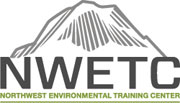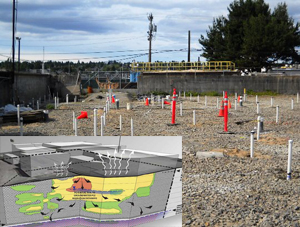|
Description: In this course, attendees will learn the basic principles of contaminant geohydrology, fate and transport, and groundwater remediation. This course will cover the scope of the groundwater contamination problem in the United States, the drivers that mandate addressing these problems, and the technical constraints and practical solutions to remediate these problems. Participants will be exposed to basic concepts of hydrogeology and contaminant transport in groundwater. Participants will also learn the status of remedial technologies employed by remedial practitioners to cleanup groundwater contaminated with the most common inorganic, organic and persistent contaminants such as fuel hydrocarbons, metals, 1,4 dioxane, perchlorates and chlorinated hydrocarbons. Case studies and active engagement with the attendees will be used to reinforce the points presented in lecture. Understanding the topics covered will provide attendees with a current and better-informed perspective on the practice of groundwater investigation and remediation. "[This course provides a] good overview of remedial technologies, including course studies." J. Mefford, December 2013 "Good short course for introduction. Very good technical knowledge of chemistry [and] geology modeling." A. Kar, December 2013 |
CEC's: 13 Technical CEC's
If you have any difficulties or questions regarding registration please call 425-270-3274 ext 100.
Please wait to receive a course confirmation email, roughly one month prior to the class, before making any travel arrangements.
Intended Audience: This course is refresher training for scientists and engineers engaged in remedial planning and implementation and as a comprehensive overview of regulations, policies, and remediation practices for non-technical facility managers, municipal planners, real estate developers, and attorneys that employ environmental remediation professionals to support their respective projects and clients.
Continuing Education Units: 1.30 CEUs
Course Topics
- Groundwater Contamination Problem Definition
- Drivers that Mandate Action
- The Importance of Conceptual Site Modeling
- Basic Hydrogeological Concepts
- Common Organic Contaminants
- Common Inorganic Contaminants
- Contaminant Fate and Transport in Groundwater
- Overview of Remedial Technologies for Organic Contaminants in Groundwate
- Overview of Remedial Technologies for Inorganic Contaminants in Groundwater
- Case Studies of Groundwater Contamination
About the Instructor
 A Professional Geologist and a Certified Hydrogeologist in California, Mike has been performing hydrogeologic investigations since 1992 and managing multi-million dollar projects since 2008 (as a Project Manager Professional since 2010). Most of his experience has been in southern California but has also worked in northern California, Nevada, and New Hampshire. He has provided technical, legal, and strategic project support for clients with soil/groundwater remediation projects; performed site- and basin-scale hydrogeologic assessments; conducted aquifer tests to assess hydraulic parameters; constructed numerical and analytical groundwater flow models and mass transport models to support remedial designs; evaluated water chemistry data (including stable isotopes) to facilitate development of conceptual models of groundwater flow systems; modeled contaminant transport in the vadose zone; and installed/developed extraction, injection, and monitoring wells and piezometers. His experience includes projects conducted for large-scale industrial and manufacturing clients, local and regional water resources and environmental agencies, and federal DoD agencies (U.S. Army Corps of Engineers, U.S. Navy, U.S. Air Force). Mike has a BS in Geosciences from Penn State University and a Masters in Geology/Hydrogeology from the University of South Florida.
What to Bring
Pen or pencil, and paper if you don't want to take notes in your manual. In person courses will have drinks, lunch and snacks provided as current health recommendations allow.
Billing Information
In order to guarantee a space in a course, the tuition must be paid in full TWO WEEKS before the first day of the course by either check or credit card. State and government agencies paying with a purchase order are allowed payment under the two-week time frame if a copy of the purchase order is received by NWETC.
If You Need to Cancel
Cancellations*-
With 31 or more days notice, we will offer a 100% refund or credit towards a future course. The credit is good for one year and may be applied to any course.
- With 30-8 days notice, we will offer a course credit towards a future course. The credit is good for one year and may be applied to any course.
- With fewer than 8 days notice, there is no course credit available
*Please note that attendee replacement is welcome at any time
Disability Accommodations
Disability Accommodations:To request disability accommodations, please contact us at info@nwetc.org or 425-270-3274 at least 30 days prior to the event.
|










